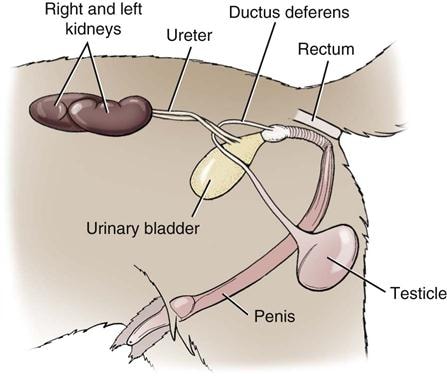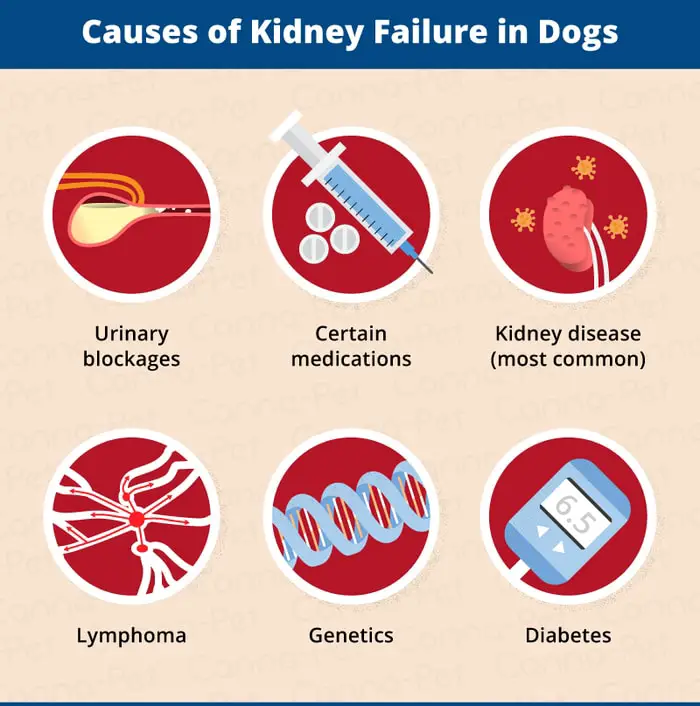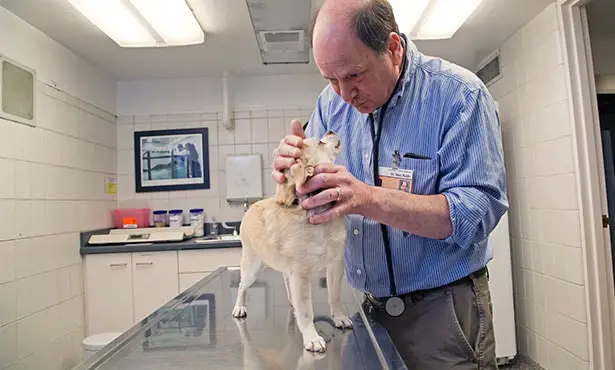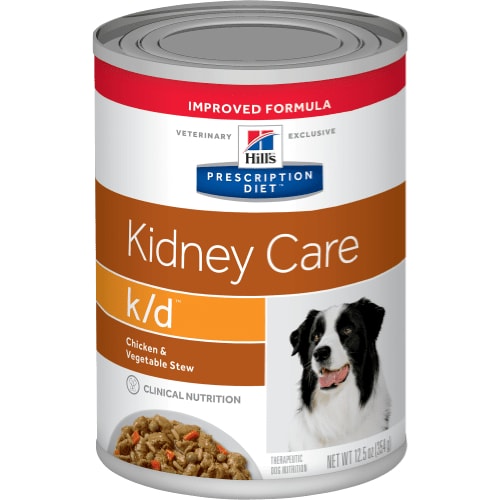Kidney failure in dogs is the most common urinary disorder that also known as Renal Failure (RF). It can affect the kidneys, and as a result, your dogs face any one of a large number of diseases-related urinary organs. Changes in a dog’s normal urinary function warrant immediate investigation by your veterinarian. Straining to urinate, the most common signs of renal failure can be caused by an infection, and when kidney function is impaired, it affects various health problems for your pets. It is a severe health problem that needs immediate veterinary attention.
What Do You Mean By Kidney Function?
The kidneys are vital organs, and kidneys are responsible for filtering the blood, retaining beneficial chemicals while ridding the body of harmful, toxic ones. Waste material is passed down the ureters to the bladder, where it is stored. When the ‘bladder has filled, your dog passes the urine through the urethra and out of the body.

What are the types of kidney failure in dogs?
There are mainly two types of renal failure in dogs; acute renal failure and chronic renal failure.
Acute Renal Failure: In acute renal failure (ARF), renal function rapidly declines over a few days. Affected dogs become ill and develop marked clinical signs. Both oliguric and polyuric forms are recognized. If renal tissue is not destroyed, there is potential for reversibility, so that your dogs need to maintain with supportive care for long enough can regain sufficient renal function to sustain everyday life.
Causes of Acute Renal Failure
Many ARF causes have been identified, but all can be broadly divided into prerenal, primarily renal, or postrenal in origin.
Prerenal Causes of ARF in Dogs
- Hypovolemia: Dehydration, hemorrhage, hypoadrenocorticism, hypoalbuminemia, use of a diuretic.
- Reduced ‘effective’ blood volume: Prolonged anesthesia, congestive heart failure, antihypertensive agents, sepsis.
- Renal hemodynamic changes: Epinephrine, prostaglandin synthesis inhibitors, hemolytic syndrome.
Primary Renal Causes of ARF in Dogs
- Nephrotoxic: Ethylene glycol, aminoglycoside antibiotics, heavy metals, radiographic contrast agents, thiacetarsemide, cisplatin, doxorubicin, amphotericin B, methoxyflurane, tetracyclines, sulfonamides, easter lily ingestion, Hgb, myoglobin.
- Infectious causes: Leptospirosis in dogs, Ehrlichiosis in dogs, and Lyme disease in Dogs.
- Other causes: Hypercalcemia.

Postrenal Causes of ARF in Dogs
- Obstruction: Urethral plugs, urethral urolithiasis, urethral stricture, bladder neoplasia with bilateral ureteral obstruction.
- Rupture of Urinary Bladder or Kidney: Trauma and post obstruction effects.
What are the Symptoms of ARF in Dogs?
Animals with ARF usually demonstrate the sudden onset of:
- Depression.
- Vomiting.
- Anorexia.
- Polydipsia.
- Oliguria is most common, but polyuria may develop during recovery or maybe present initially depending on the underlying cause of ARF.
- Seizures and muscle fasciculations may be observed, and terminal patients can develop coma.
- Affected patients may be dehydrated.
- A characteristic ‘ uremic breath ‘ odor may be apparent and affected patients are often hypothermic if ARF s not due to bacterial infection.
- Hyperkalemia and severe metabolic acidosis with a wide anion gap usually develop in patients with postrenal azotemia or the ARF oliguric form.
Diagnosis of Acute Renal Failure in Dogs
- ARF is readily recognized when a history of exposure to nephrotoxins is associated with rapidly rising serum creatinine and Blood Urea Nitrogen (BUN).
- Your veterinarian performed various types of laboratory tests that are very effective for diagnosing the ARF.
- Urinalysis reveals mild proteinuria with active urine sediment, including many granular casts and exfoliated epithelial cells.
- On radiographic examination, the kidneys may be normal-sized or enlarged.
- Contrast studies may assist in determining the location of rupture or obstruction in the urinary tract.
- An ultrasonic examination can assist in diagnosis.
- In some instances, renal biopsy is necessary to distinguish between ARF and CRF and determine the severity of the renal injury.
- Because of the high risk of bleeding, renal biopsy is not routinely performed.
Chronic Renal Failure in Dogs
Chronic Renal Failure (CRF) is a state of stable or slowly progressive azotemia, occurs at the mean age of seven years in dogs. However, there is a peak of occurrence in the young because of congenital and developmental renal disease in both dogs and cats, and both your dogs and cats become prone to CRF as they become elderly. Prolonged azotemia and altered renal function combine to give rise to the spectrum of clinical feathers known as a uremic syndrome.
Causes of Chronic Renal Failure
The common causes of chronic renal failure in dogs are:
- Idiopathic chronic interstitial nephritis.
- Irreversible ARF.
- Familial renal dysplasia and aplasia.
- Congenital polycystic kidney disease.
- Amyloidosis.
- Glomerulonephritis.
- Hypercalcemia.
- Bilateral hydronephrosis.
- Leptospirosis in dogs.
- Pyelonephritis in dogs.
- Bacterial ascending disease in kidneys.
- Hematogenous causes of CRF.
- Fungal infection in the urinary system.
- Bi-lateral Nephrolithiasis.
- Fanconi-like syndrome
- Hypertension
Dog Breeds Prone to CRF
Following dog breeds are prone to CRF, and you will notice very frequently during their older age. The dog breeds are:
- Norwegian Elkhound.
- Lhasa Apso.
- Shih Tzu.
- Samoyed.
- Cocker Spaniel
- Doberman Pinscher.
- Standard Poodle.
- Golden Retriever.
- Soft-coated Wheaten Terrier.

What are the Symptoms of CRF in Dogs?
The most signs and symptoms of chronic renal failure in dogs are:
- Reduce appetite.
- Gradual weight loss in aged dogs.
- Poor hair coat and looks irregular.
- Both thirst and urine volume is increased, with many patients obligated to urinate during the night.
- Vomiting is common, and in advanced cases, melena may develop.
- Exercise tolerance is reduced, and neurologic signs may include depression, lethargy, weakness, twitching, tremors, head bobbing, and seizures.
Diagnosis of Chronic Renal Failure in Dogs
The standard diagnostic procedures of CRF in dogs are:
- The presence of CRF is established based on clinical history, physical examination, and laboratory test results.
- Your veterinarian performs these examinations and tests, and he or she analyzes typical test results.
- These test results include normocytic normochromic anemia, lymphopenia, azotemia, hyperphosphatemia, and metabolic acidosis with an increased anion group.
- Urinalysis shows isosthenuria, mild proteinuria, and soft urine sediment.
- On those occasions when tubular casts are observed.
- They tend to have a wide diameter.
- Renal size shape and density may be abnormal on radiographic and ultrasonographic evaluation.
- Renal biopsy shows glomerular and tubular atrophy with variable degrees of glomerulosclerosis and mononuclear interstitial infiltrate with fibrosis.

Treating Kidney Failure in Dogs
The treatment methods of kidney failure vary depending on the cause and the overall health condition of your pets. Recognition and correction of initiating factors of ARF must be prompt to minimize permanent renal damage.
- Treatment can be divided into nonspecific management applicable to all patients with ARF and specific management, which vary with the initiating cause.
- Specific treatment for the causes of ARF is available for ethylene glycol intoxication.
- In case of chronic renal failure in your dogs, require stabilization of an acute crisis with appropriate fluid and electrolyte treatment.
- The causes of your pet, both renal damage, and progression of renal failure must be identified and eliminated, if possible.
- Your veterinarian should be advised of our pet’s limited adaptability to sudden changes in environment and diet.
Preventing of Kidney Failure in Dogs
The preventive measures that you can follow easily are:
- Your dogs should be kept away from the chemicals.
- Control of secondary renal hyperparathyroidism.
- Dietary supplementation with B-complex and C vitamins.
- Avoid exposure to medication and other harmful substances that is contaminated water sources, raisins, prescription and over-the-counter drugs, like ibuprofen.
- You can feed grapes to your dogs.
- Dental care maintains and keeping your dog’s teeth clean.
- Correction of anemia and dietary adjustment.
- Dialysis is indicated in your dogs with severe azotemia, life-threatening hyperkalemia.

Renal Failure in Dogs: Dog Kidney Failure Diet
Your experts may suggest a specific type of food with a different diet and nutrients that are good for your pets and needs for this situation. In this condition, some foods you may avoid because this type of food can harm your dogs. These include:
- Chocolate.
- Alcohol.
- Coffee.
- Coconut.
- Caffeine.
- Milk and dairy products.
- Grapes and raisins.
- Onions, garlic, chives, yeast dough.
- Xylitol.
- Salty/processed snack foods.
- Undercooked or raw eggs and meat.